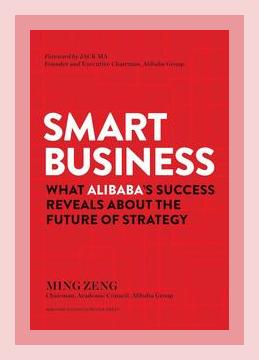Business StrategyBusiness Ecosystems
Introduction
“Smart Business: What Alibaba’s Success Reveals about the Future of Strategy” by Ming Zeng offers an in-depth examination of the revolutionary strategies employed by the Chinese e-commerce giant Alibaba. The book provides insights into how businesses can adapt to digital transformation by adopting new technological paradigms and leveraging business ecosystems. This summary will cover the key points in a structured format, providing concrete examples from the book and actionable steps for implementation.
The Evolution of Smart Business
Key Point 1: Data as the New Oil
Ming Zeng emphasizes that data is the cornerstone of smart business. Companies should leverage big data to make informed decisions and optimize operations.
Example:
Alibaba’s use of data analytics to optimize logistics and improve delivery times through its Cainiao Network exemplifies this principle.
Actionable Step:
Invest in a robust data collection and analytics infrastructure. Tools like machine learning algorithms can help analyze customer behavior and improve service delivery.
Key Point 2: Platform Business Models
Platforms that enable ecosystems are more dynamically adaptable compared to traditional pipelines. Alibaba’s ecosystem encompasses various businesses like Taobao, Tmall, and Alipay.
Example:
Taobao, Alibaba’s online shopping platform, allows millions of small and medium-sized enterprises (SMEs) to reach a large consumer base, creating a diverse and competitive market.
Actionable Step:
Develop platform-based services that allow third-party vendors to operate within your ecosystem. Encourage synergies and partnerships that can enhance the value of your platform.
Building a Network of Synergies
Key Point 3: Integrated Business Ecosystems
Zeng highlights the importance of creating integrated business ecosystems where businesses, providers, and consumers mutually benefit from network effects.
Example:
Alibaba integrates its e-commerce platforms with its payment system (Alipay), cloud computing (Aliyun), and logistics (Cainiao), creating a seamless experience for both buyers and sellers.
Actionable Step:
Create partnerships with complementary businesses to build an ecosystem where data and services are seamlessly integrated. This could involve collaboration with tech firms, suppliers, and other service providers.
Key Point 4: Customer-Centric Innovations
Understanding and anticipating customer needs is paramount. Alibaba uses AI to offer personalized recommendations, enhancing customer satisfaction and retention.
Example:
Alibaba’s recommendation algorithms analyze user behavior to surface products tailored to individual preferences, leading to increased sales and customer loyalty.
Actionable Step:
Implement AI-driven recommendation systems on your digital platforms to provide personalized experiences for users. Regularly update and refine algorithms based on new data.
Dynamic Capabilities and Agile Operations
Key Point 5: Business Agility and Flexibility
Adaptability is a critical attribute of a successful business in a rapidly changing market environment. Alibaba fosters an entrepreneurial culture that encourages quick adaptation and innovation.
Example:
Alibaba’s decision to pivot from a consumer-to-consumer model to include business-to-consumer (B2C) transactions with the launch of Tmall demonstrates its agile approach to market demands.
Actionable Step:
Encourage a culture of agility within your organization. Create strategic units or “innovation labs” focused on exploring new market opportunities and testing quick pivots.
Key Point 6: Empowerment of Managers and Employees
Zeng points out that decentralized decision-making empowers teams to act quickly and effectively. Alibaba employs a management philosophy that grants considerable autonomy to business units and individuals.
Example:
Alibaba’s “Lake of Honey” approach, where managers run their units like small startups, enables rapid decision-making and innovation.
Actionable Step:
Decentralize decision-making authority by empowering mid-level managers and teams to take initiative without excessive bureaucratic oversight.
Leveraging Technology for Competitive Advantage
Key Point 7: Embracing Artificial Intelligence
AI, as a technological driver, plays a vital role in transforming businesses by enhancing efficiencies and fostering intelligent decision-making.
Example:
Alibaba’s City Brain project uses AI to improve urban management, reducing traffic congestion and resource allocation more effectively than traditional methods.
Actionable Step:
Incorporate AI technologies into your core operations, whether through streamlining supply chains, improving customer service, or enhancing product development.
Key Point 8: The Importance of Cloud Computing
Cloud computing is crucial for scalability and flexibility. Alibaba Cloud (Aliyun) supports the entire ecosystem, providing scalable computing resources.
Example:
During the annual Singles’ Day shopping event, Alibaba processes transactions worth billions of dollars without a hitch, thanks to its scalable cloud infrastructure.
Actionable Step:
Invest in cloud computing solutions to support your business operations, ensuring scalability and reliability during peak times and aiding in data storage and processing.
The Future of Strategy and Competitive Landscapes
Key Point 9: Ecosystem Leadership
Being a leader in a business ecosystem rather than a solitary dominator allows for collaboration and innovation. Alibaba sets the standards and develops the protocols for its ecosystem, guiding and benefiting other players.
Example:
Alibaba’s eWTP initiative, aimed at enabling global e-commerce, showcases its role in guiding international trade practices and setting new benchmarks.
Actionable Step:
Position your company as a thought leader and facilitator within your industry ecosystem. Drive collaborative initiatives that set industry standards and foster collective growth.
Key Point 10: Continuous Learning and Development
Staying ahead requires a commitment to continuous learning and adaptation. Alibaba invests heavily in educating and developing its workforce to be future-ready.
Example:
Alibaba’s management training programs, such as the Taobao University, equip employees and partners with skills in digital marketing, data analytics, and e-commerce.
Actionable Step:
Implement continuous learning programs within your organization. Offer training in emerging technologies and industry trends to ensure your team remains at the forefront of innovation.
Conclusion
Ming Zeng’s “Smart Business: What Alibaba’s Success Reveals About the Future of Strategy” provides valuable insights into how companies can innovate and thrive in the digital age. By leveraging data, building integrated ecosystems, deploying advanced technologies, and fostering a culture of agility and continuous learning, businesses can achieve sustained growth and competitive advantage. The actionable steps derived from Alibaba’s success can serve as a roadmap for organizations looking to navigate the complex landscape of modern business effectively.
